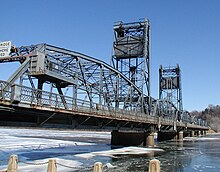Stillwater Bridge (St. Croix River)
| Stillwater Bridge | |
|---|---|

The Stillwater Lift Bridge from the southwest
|
|
| Carries |
|
| Crosses | St. Croix River |
| Locale | Stillwater, Minnesota |
| Maintained by | Minnesota Department of Transportation |
| ID number | 4654 (Minnesota), M-61 (Wisconsin) |
| Characteristics | |
| Design | vertical-lift bridge |
| Total length | 1,050 feet (320 m) |
| Width | 23 feet (7.0 m) |
| Longest span | 140 feet (43 m) |
| History | |
| Opened | 1931 |
| Statistics | |
| Daily traffic |
18,000 |
|
Stillwater Bridge
|
|
| Coordinates | 45°3′23″N 92°48′12″W / 45.05639°N 92.80333°WCoordinates: 45°3′23″N 92°48′12″W / 45.05639°N 92.80333°W |
| Area | Less than 1 acre (0.40 ha) |
| Built | 1931 |
| Built by | American Bridge Company, Peppard and Fulton |
| Architect | Ash, Howard, Needles, and Tammen; Minnesota Department of Highways |
| NRHP Reference # | 89000445 |
| Added to NRHP | May 25, 1989 |
18,000
The Stillwater Bridge (alternatively known as the Stillwater Lift Bridge, St. Croix River Bridge at Stillwater, Mn/DOT Bridge #4654, and Wis/DOT Bridge #M-61) is a vertical-lift bridge crossing the St. Croix River between Stillwater, Minnesota, and Houlton, Wisconsin. It connects Minnesota State Highway 36 and Wisconsin Highway 64. Around 18,000 vehicles cross the bridge daily. Construction of a new bridge crossing the St. Croix river valley is underway to the south of Stillwater, connecting the towns of Oak Park Heights, Minnesota and St. Joseph, Wisconsin. The bridge is scheduled to open to highway traffic in 2016, at which point the Stillwater Lift Bridge will be converted to bicycle/pedestrian use.
The bridge was listed on the National Register of Historic Places in 1989 for having state-level significance in the theme of engineering. It was nominated for being a rare surviving example of a vertical-lift highway bridge based on the designs pioneered by Waddell & Harrington. The Stillwater Lift Bridge is one of two bridges on the St. Croix River between the Interstate 94 bridge in Hudson, Wisconsin, and the U.S. Highway 8 bridge in Taylors Falls, Minnesota, providing a popular and useful alternative to those crossings. (The other bridge is the Minnesota State Highway 243 bridge at Osceola, Wisconsin.)
The bridge consists of seven fixed steel truss spans 1,050 feet (320 m) long in total, including a vertically lifting span 140 feet (43 m) long. It is 23 feet (7.0 m) wide, allowing one lane of traffic in each direction. The lifting span is a Waddell & Harrington type, one of six built in Minnesota and Wisconsin and one of three still remaining today. Built in 1931 to replace a swing bridge from 1910, it was the last bridge of this design to be built in the area. Minnesota and Wisconsin evenly split the $460,174 cost of the bridge.
...
Wikipedia

